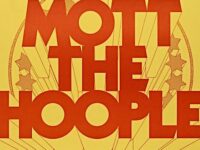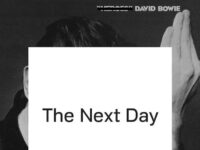Mott the Hoople should have been huge. They should have been selling out arenas, rather then barely filling theaters as headliners in America, when they weren’t opening for Queen back in the 1970s. But in the same hard luck fashion so typical of this great band’s mostly unfortunate history, they split up at right about the same time they actually started selling some records.
Mott the Hoople have often (and accurately) been described as what the Rolling Stones might sound like if Bob Dylan fronted the band instead of Mick Jagger. Led by charismatic, curly-locked singer/songwriter Ian Hunter — who also may be the most famous rock star never photographed without his trademark shades, this side of Steppenwolf’s John Kay or Roy Orbison — Mott toiled away for years cranking out modest-selling albums like Brain Capers, featuring bizarrely titled songs like “Death May Be Your Santa Claus,” just before being “discovered” by David Bowie.
Ziggy wrote them a hit single in “All The Young Dudes” and produced the album of the same name, which made them instant sensations with the ’70s glam-rock crowd (a role they reluctantly accepted, but were never completely comfortable with, in the interests of “making it” as big-time rock stars). Just as the two followups to Dudes — the critically acclaimed Mott, and its successor The Hoople — seemed to put the exclamation point on Mott’s future as one of rock’s great bands, guitarist Mick Ralphs abruptly left to form Bad Company with Paul Rodgers. But Ralphs’ replacement Luther Grosvenor (for his tenure with Mott, the ex-Spooky Tooth guitarist was given a glam-rock makeover and renamed Ariel Bender), never really fit the band, and also didn’t play nearly as well as Ralphs (to put it politely).
By the time ex-Bowie guitarist Mick Ronson was in, and Ariel Bender was out, the band was already falling apart.
These days, Ian Hunter is best remembered as the guy who wrote one-hit-wonder Great White’s 1980s hair-metal cover of “Once Bitten, Twice Shy.” (Great White is to Mott the Hoople, as Quiet Riot is to similar 1970s glam-rockers Slade.) But after Mott the Hoople split up for good, Ian Hunter, with Ronson in tow, continued to make solo albums — including at least three underrated classics in his self-titled debut, and its two followups All American Alien Boy and You’re Never Alone with a Schizophrenic. The newly re-christened Hunter-Ronson Band also toured incessantly, and Live At Rockpalast 1980 is a better document of this period than it really has any right to be. Recorded for a late-night television concert series from Germany’s Rockpalast, this concert displays both the short-lived band’s many strengths, but also a few of its weaknesses.
The late Ronson is definitely a great onstage foil for Hunter here, and his razor-sharp playing is much in evidence throughout this DVD. However, he also appears to be holding back at times. When the band launches into Mott the Hoople’s near-hit “All The Way From Memphis,” it lacks the 1970s glam-rock snarl of known live Mott recordings (even with the hapless Grosvenor). After Hunter sings “took out my six-string razor, and hit the sky,” you keep waiting for that great lead part from the original record. But it never comes. However, Ronson does add some impressive new lead guitar bits to the chorus. A version of “Once Bitten, Twice Shy” likewise falls just a bit short of the original version, although it is thankfully a bit grittier sounding than the ’80s polish of the Great White cover (“they taught us how to love”).
Songs like “I Wish I Was Your Mother” and “Irene Wilde” also display Hunter’s considerable talents as a songwriter cut straight from the Blonde On Blonde-era Dylan mold. This was something Hunter was trying to focus on more following his days as a 1970s glam-rocker with Mott, and although the songs are undeniably good, I have to admit I still found myself waiting for the band to bust out a bit more here.
Outside of Hunter and Ronson, there are a bunch of really non-descript players. Good at what they do, sure. But also lacking both the admitted sloppiness, yet undeniable explosiveness of what Mott the Hoople could do on a great night. It’s right about here that you really want to see Hunter strap on that giant “H” guitar, and kick some ass. Or at least, those ridiculous, knee-high boots worn by bassist Pete “Overend” Watts during Mott’s glammier days.
Fortunately, the band rallies somewhat to kick things up a notch with the rockers, including “Cleveland Rocks,” “Just Another Night,” “All The Young Dudes,” and especially a scorching version of “Bastard” from Hunter’s great Schizophrenic album. Here, the band falls into a tight-ass little funk pocket (well, outside of some misplaced synthesizer anyway), and Ronson gets a chance to flex his muscles on guitar a bit more. Ian Hunter also bites off the lyrical phrases to this song with all the fiery spirit of his obvious hero, Dylan. This performance alone is worth the price of admission.
Live At Rockpalast 1980 isn’t perfect, by any means. But it is still just about as good a document of Ian Hunter at his post-Mott the Hoople peak as one could have hoped for. It’s also a real treat to see Mick Ronson rock out on guitar, even if those moments are a little too fleeting on this DVD. It should also be noted that although both the cover and the inlay feature black and white shots of the concert, this concert is indeed shot in color, grainy as it sometimes is.
Now, if they could just find some equally vintage, choice Mott the Hoople footage …
- Pink Floyd – The Story Of 'Wish You Were Here' (2012) - June 29, 2012
- 'Neil Young FAQ' Diaries: On the Beach, Now and Then and the Kershaw Connection - June 15, 2012
- The Rockologist: The Raconteurs – Live At Montreux (2012) - June 8, 2012





Mott The Hoople never opened for Queen. Mott were the only band that Queen opened for.
Did I somehow get that reversed? If so, thank you for pointing it out. -Glen
Ariel Bender, hapless? Hardly. He single handedly upped the ante on MTH’s rock bona fides and–need I remind you–completely stole the Live album with his smouldering solos, especially during the now legendary “medley” portion. He was never given a chance to develop any songwriting chemistry with Hunter and that’s why he was unceremoniously dumped. Had nothing to do with his playing.
Okay, in fairness to Bender, I’ll grant you that “hapless” might be overstating it a bit, and he did have some nice bits on “Live” (that “glam rock snarl” I refer to elsewhere in the review). But he wasn’t anywhere near the league of Ralphs or Ronson. Thanks for the comment. -Glen
Glen – as already pointed out Queen opened for MTH – and MTH were the first rock band to play Broadway.